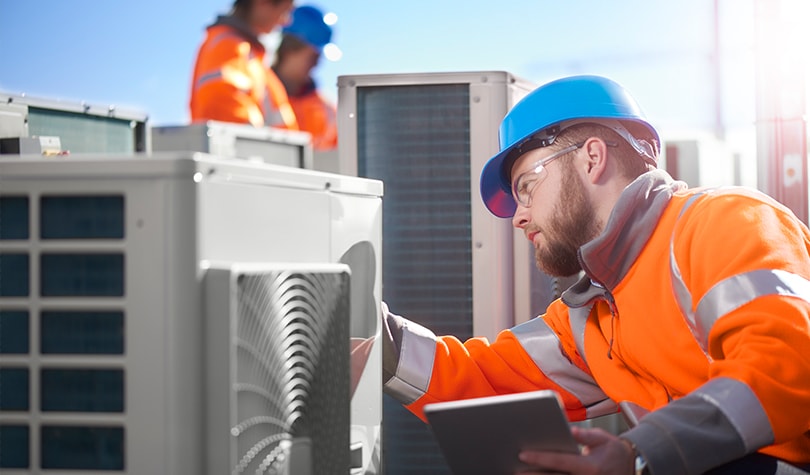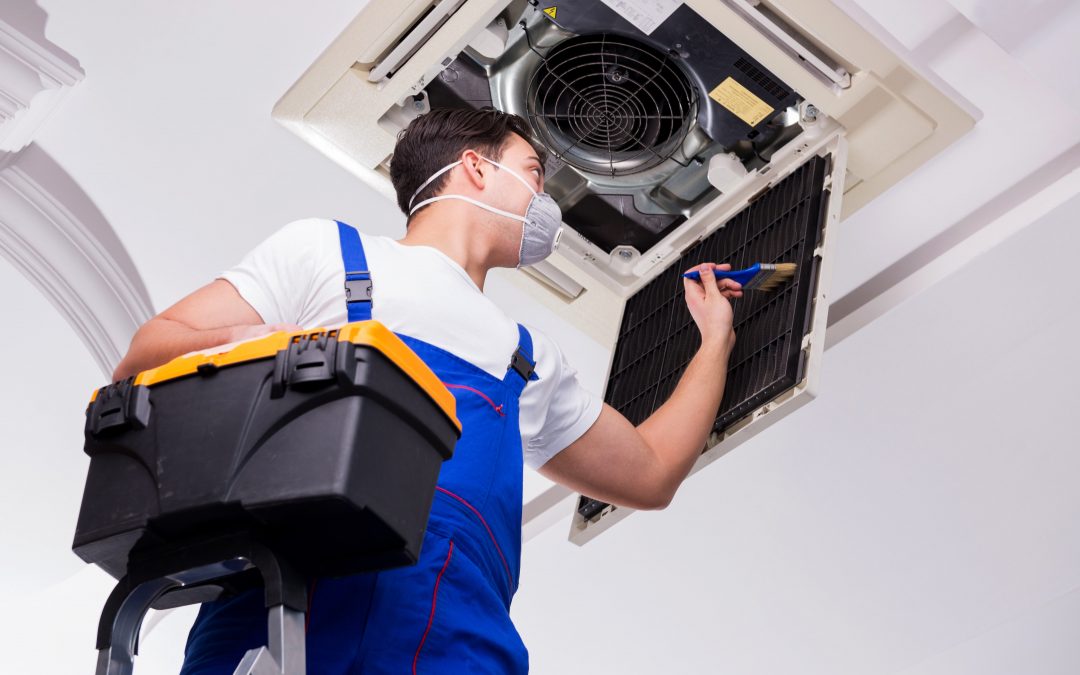HVAC contractor tips for spotting bad odors early
Wiki Article
Everything about Heating And Cooling: Identifying Common Issues and Effective Air Conditioning Fixing Methods
Heating and cooling systems are crucial for maintaining interior convenience. Recognizing their parts and performance is important for determining typical issues. Property owners typically encounter troubles such as inefficient cooling, unusual odors, or rising power prices. These signs can suggest underlying concerns that may call for focus. Discovering do it yourself troubleshooting methods can be useful, but understanding when to seek expert assistance is just as essential. What steps can be taken to assure lasting performance?Understanding Your Cooling And Heating System: Elements and Capability
A cooling and heating system, typically thought about the foundation of interior climate control, includes a number of key parts that collaborate to control temperature level and air top quality. The primary elements include the home heating system, ventilation system, and cooling system. The heating unit, commonly a heater or central heating boiler, generates warmth during colder months, while the cooling system cools indoor areas during the summer season.
Typical A/c Problems Property Owners Encounter
Homeowners frequently face several usual cooling and heating troubles, consisting of irregular temperature level distribution throughout their space. In addition, uncommon sounds throughout operation can suggest underlying problems that require interest. Addressing these concerns quickly is necessary for maintaining ideal system efficiency.Irregular Temperature Level Distribution
Numerous houses experience the aggravating concern of inconsistent temperature distribution, where certain rooms really feel uncomfortably cozy while others remain as well chilly. This issue often arises from a range of variables, consisting of bad insulation, obstructed vents, or a poorly sized a/c system. When ducts are not effectively secured or when furnishings obstructs air flow, some rooms may obtain not enough air conditioning. Additionally, thermostat positioning can substantially influence temperature law; a thermostat located in a sunlit location may misrepresent the total temperature of your home. Normal maintenance, including cleansing filters and ensuring ductwork is clear, can help alleviate these inconsistencies. Home owners might also take into consideration zoning systems to better control temperatures throughout various locations of the home, promoting a much more comfy living setting.Unusual Noises During Procedure
When a cooling and heating system runs, uncommon noises can indicate underlying issues that require attention. Property owners might run into a variety of sounds, such as grinding, squealing, or hissing. Grinding noises usually signal damaged bearings or elements, while squealing can suggest loose belts or parts requiring lubrication. Hissing may suggest a cooling agent leak, which can compromise the system's performance. Additionally, banging audios could indicate loose ductwork or a problem with the blower follower. Each of these sounds works as a caution, triggering house owners to explore better. Overlooking these signs can result in more significant problems and expensive repairs. Normal maintenance and prompt focus to uncommon noises can boost system long life and performance, guaranteeing a comfortable living setting.Signs That Indicate Your AC Demands Fixing
Exactly how can one inform if their cooling system requires repair work? A number of indications may suggest underlying problems needing expert attention. First, if the AC stops working to cool down the space efficiently, it may recommend a refrigerant leakage or compressor malfunction. In addition, an increase in energy costs without matching use modifications can indicate inadequacy in the system. Property owners ought to likewise look out to unusual smells emanating from the unit, which could suggest mold development or electrical problems. If the AC often cycles on and off, it may be an indicator of a defective thermostat or other mechanical issues. Lastly, the visibility of water pooling around the unit can suggest a clogged drain line. Acknowledging these indicators early can conserve money and time, guaranteeing that the cooling system operates efficiently and efficiently.Do It Yourself Troubleshooting Techniques for A/c Issues
When dealing with heating and cooling concerns, property owners can utilize a number of DIY fixing strategies to determine the trouble. Key techniques include checking thermostat settings, inspecting air filters, and evaluating drainage issues. These actions can aid pinpoint usual breakdowns prior to looking for professional assistance.Checking Thermostat Settings
What steps should home owners take to assure their thermostat settings are proper? They need to verify the thermostat is established to the wanted temperature and mode, whether heating or cooling. Inspecting for a clear display screen and verifying the thermostat is not set to "hold" or "vacation" mode is crucial. Homeowners must likewise validate that the thermostat is degree and installed in a location totally free from drafts, straight sunshine, or other temperature level affects. Additionally, recalibrating the thermostat can help supply exact analyses. If the thermostat runs on batteries, changing them might resolve any type of problems. By methodically evaluating these aspects, house owners can frequently identify and fix thermostat-related problems, promoting ideal a/c system efficiency.Inspecting Air Filters
Air filters play an essential duty in preserving ideal a/c efficiency. They catch dirt, irritants, and various other fragments, making sure tidy air circulation. Over time, filters can become stopped up, minimizing airflow and efficiency. To examine air filters, people must initially find the filter, typically found in the return duct or near the furnace. Once situated, they should assess the filter's condition-- if it shows up filthy or stained, it likely demands substitute. Most filters need altering every 1-3 months, depending upon use and ecological aspects. Regular assessment and prompt replacement of air filters not only boost air high quality but likewise extend the life-span of cooling and heating systems, preventing potential breakdowns and costly fixings.
Assessing Drain Issues
How can home owners successfully recognize and attend to water drainage concerns within their cooling and heating systems? First, they must examine the condensate drain line for clogs or blockages, which can bring about water build-up. here Home owners may utilize a wet/dry vacuum cleaner to get rid of any kind of particles blocking the line. Next, examining the drainpipe pan for corrosion or leaks is crucial, as a damaged pan can trigger water to overflow. Routine cleaning of the drainpipe line with a mix of vinegar and water aids stop future blockages. In addition, guaranteeing correct slope of the drain line advertises effective water circulation. If these DIY strategies do not solve the issue, seeking advice from a specialist heating and cooling specialist might be necessary to avoid potential water damage and system failing.When to Call an Expert for Air Conditioner Repairs

While some air conditioning problems can be managed through DIY techniques, there are situations where calling a specialist comes to be necessary. Property owners need to look for professional assistance when they encounter consistent troubles, such as insufficient cooling, unusual sounds, or unusual odors originating from the unit. These signs may indicate much deeper issues that need specialized understanding and tools to detect and fix properly.

Preventative Upkeep Tips for A/c Durability
Normal preventative maintenance can greatly boost the longevity of a/c systems. Property owners ought to arrange yearly assessments by qualified service technicians to evaluate system performance and recognize prospective concerns. Routinely changing or cleansing air filters is important, as this warranties correct air movement and reduces strain on more info the system. Additionally, examining and securing ductwork avoids energy loss and improves total efficiency.
It is also advisable to keep the exterior unit free from particles and plants, permitting peak air flow and heat exchange. Homeowners must check the condensate drain for blockages to stay clear of water damage and mold growth. Additionally, preserving proper thermostat settings and utilizing programmable choices can enhance energy performance. Documenting maintenance activities aids track service background and can assist in recognizing reoccuring problems. By following these preventative steps, people can maximize the performance and life expectancy of their cooling and heating systems
Often Asked Questions
How Commonly Should I Replace My HVAC System Filters?
HVAC system filters need to generally be replaced every one to 3 months, depending on use, filter kind, and environmental elements. Regular replacement helps preserve effectiveness and air high quality, ensuring peak system performance throughout the year.What Dimension A/c System Do I Required for My Home?
To determine the appropriate HVAC system size for a home, one must think about square footage, insulation top quality, and regional climate. Consulting an expert can aid ensure maximum performance and convenience for the particular living space.Are There Eco-Friendly A/c Options Available?
Yes, eco-friendly cooling and heating options are available, consisting of energy-efficient heatpump, solar-powered systems, and geothermal home heating. These choices minimize energy consumption and ecological influence, promoting sustainability while keeping effective environment control for household and industrial rooms.Just How Can I Enhance My HVAC System's Energy Effectiveness?
To improve a/c energy efficiency, one can frequently maintain the system, seal air leakages, mount programmable thermostats, utilize energy-efficient filters, and warranty ample insulation throughout the home to minimize power consumption and boost performance.
What Is the Average Life Expectancy of a HVAC System?
The typical lifespan of a click here cooling and heating system usually ranges from 15 to 25 years, relying on elements such as upkeep, use, and the top quality of setup. Routine maintenance can substantially prolong its functional durability.Conclusion
In recap, a comprehensive understanding of cooling and heating systems encourages house owners to recognize usual problems and address minor issues effectively. Identifying indicators of malfunction, employing DIY repairing strategies, and focusing on normal upkeep can improve system efficiency and effectiveness. When faced with complicated repairs, employing specialist help is critical to guarantee safety and long life. By promoting awareness and aggressive treatment, individuals can appreciate a comfy interior setting while reducing unanticipated expenses connected with HVAC failures.Report this wiki page